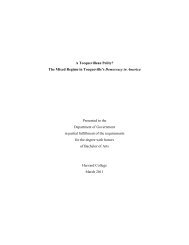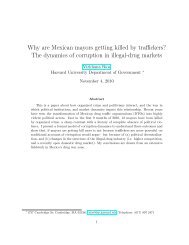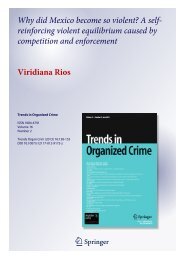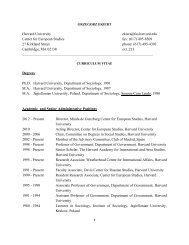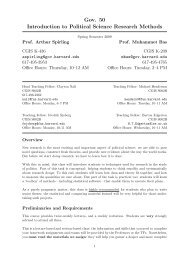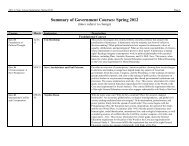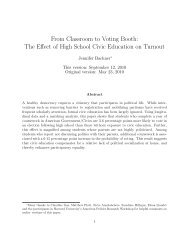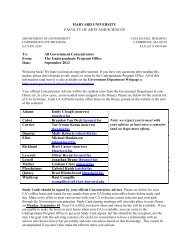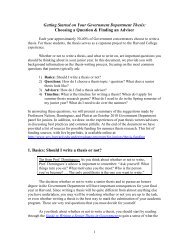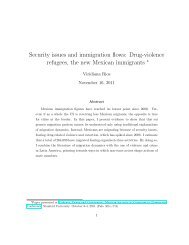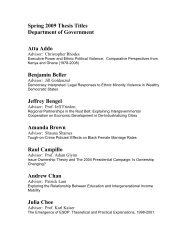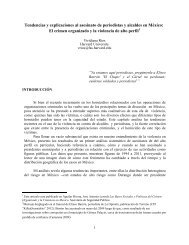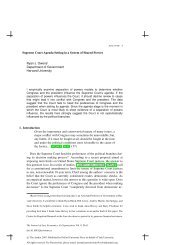1 Harvard University Political Theory Colloquium For 11 March 2010 ...
1 Harvard University Political Theory Colloquium For 11 March 2010 ...
1 Harvard University Political Theory Colloquium For 11 March 2010 ...
You also want an ePaper? Increase the reach of your titles
YUMPU automatically turns print PDFs into web optimized ePapers that Google loves.
7 <br />
achieved through self-integration involving scrutiny and adjustment of beliefs and desires<br />
in the light of one’s overall conception of the good (Moran 2001: 108, <strong>11</strong>8). McGeer,<br />
who had pioneered a similar ‘agency model of authoritative self-knowledge’ (McGeer<br />
1996: 506), 8 makes an important amendment to this point. <strong>For</strong> Moran, deliberation<br />
excludes the ‘idiom of “control”’ (Moran 2001: <strong>11</strong>9). <strong>For</strong> McGeer, in contrast, ‘[f]irstperson<br />
authority can very much depend on our abilities to exercise rational control’ –<br />
though she prefers ‘to speak of “self-regulation” or “self-governance”’ (McGeer 2007:<br />
89, where she draws precisely this contrast with the quoted view of Moran).<br />
Taking Moran and McGeer together yields a portrait of first-person authority and<br />
self-knowledge as consisting in something strikingly akin to the cultivation of selfcontrol,<br />
understood as self-governance, which constitutes the virtue of sôphrosunê in<br />
Plato. In a famous passage of Republic IV, the just person ‘puts himself in order’, and<br />
‘regulates well what is really his own and rules himself’ (both, 443d), doing so through<br />
an ongoing exercise of virtue that is not a tyrannical subduing of desire but rather an<br />
assertion of what we will see to be (for Plato) the natural exercise of rule of knowledge:<br />
an assertion which I will find also to be implicit in the Protagoras.<br />
A similar parallel holds for the discussion of akrasia as the failure of selfknowledge.<br />
On Moran’s account, akrasia is not something which one can acknowledge<br />
in speaking with first-person authority (128), though one may acknowledge it in<br />
observing one’s past behavior or in predicting (as opposed to deliberating) one’s actions<br />
in the future, and it may also be identified by third parties. Akrasia is not the result of a<br />
wrong outcome of deliberation, nor of a hijacking of deliberation, but rather of a failure<br />
of the first-person authoritative stance. The akratic does not speak for herself nor does<br />
she attain conviction about how to act: rather her behaviour cannot be thought of (by her,<br />
or therefore by others) as intentional action at all. (127-8) The role of an as-it-were thirdperson<br />
evaluation of one’s moral condition accords with Raphael Woolf’s recent analysis<br />
of the dramatic absence of first-person introspection (or rather its casting in third-person<br />
terms) in Plato’s Socrates (Woolf 2008). Yet whereas Woolf suggests in a footnote that<br />
the absence of the Cartesian epistemological observational privilege of the first-person in<br />
Plato leaves open the possibility of other approaches to first-person authority as in<br />
Moran’s work (Woolf 2008: 93 n.37), I will argue that Plato himself demonstrates such



